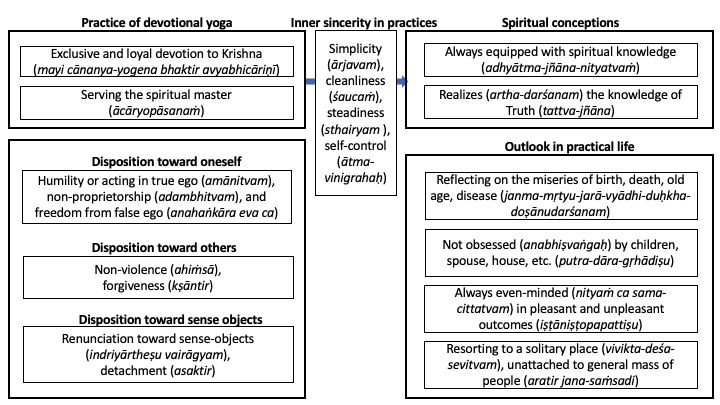Krishna already elaborated on the field of activities and its two knowers, which together constitute knowledge. What is the content and essence of that knowledge owing to which one can be considered to be in knowledge? What are the practices, inner dispositions, conceptions, and the outlook of the person in knowledge? Krishna explains that the content and process of knowledge are attributed to divine qualities with the help of which we can escape the entangling influence of the field of activities and its transformations.
In the previous section, Krishna already presented a detailed understanding of kṣetraṁ and kṣetra-jñaṁ. Now, Krishna begins to address Arjuna’s question on the pair, jñānam and jñeyaṁ. Krishna first brings our attention to jñānam, which is normally understood to be pieces of information put together to form what is called knowledge. Krishna takes us beyond this stereotypical understanding and lists down 20 divine qualities, and declares them as jñānam, or the content of knowledge (etaj jñānam iti proktam). Furthermore, in order to make the presentation complete, Krishna also states that anything outside of the listed qualities is characterized as ignorance (ajñānaṁ yad ato ’nyathā). (BG 13.08-12)
One who is on the true platform of knowledge acts with the following qualities. The pivot of the divine qualities is the exclusive and loyal practice of devotional yoga, which is best done through the service to one’s spiritual master. In the practice of devotional yoga, the practitioner carries a spiritual disposition toward oneself, others, and the sense objects. One is free from false ego and instead acts from the platform of true ego, i.e., understanding oneself to be an insignificant part and parcel of Krishna. One also carries a proper understanding that one is not the proprietor of one’s possessions. One maintains a non-violent and forgiving disposition toward others. One carries a spirit of renunciation and detachment toward the sense objects.
One brings an inner sincerity in one’s practices, characterized by simplicity, cleanliness, steadiness and self-control. This inner sincerity kindles the development of spiritual conceptions because of which one is always equipped with spiritual knowledge. One is constantly pursuing the philosophical research for the sake of developing the true knowledge, which matures into realization of the Absolute Truth. Naturally, one carries a transcendental outlook in one’s practical life.
There is an ongoing reflection on the miseries associated with birth, death, old age and disease. One is not obsessed by children, spouse, house, etc. One is even-minded in pleasant and unpleasant situations alike. One carefully avoids the association of the general mass of people and keeps oneself secluded to maintain focus in the spiritual life.








